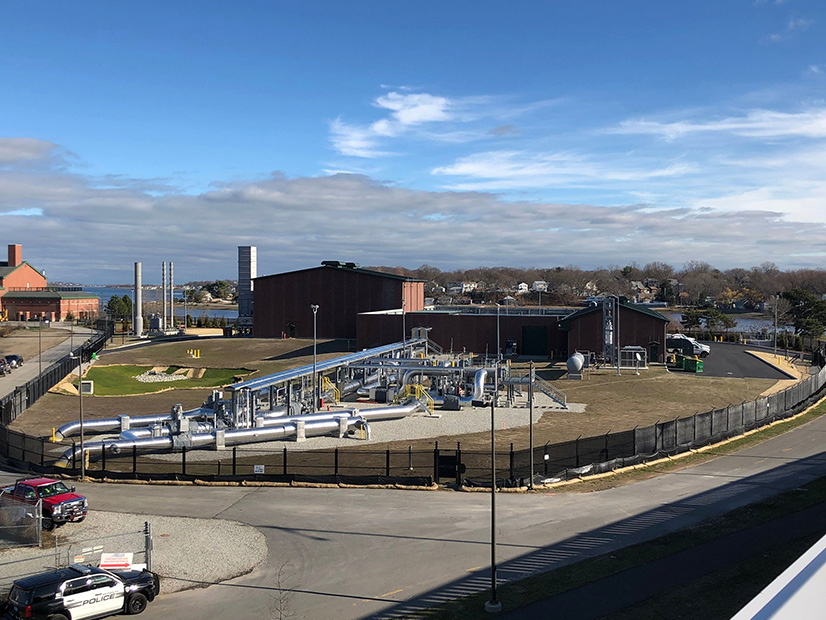
FERC declined to take action against Enbridge’s Weymouth Compressor Station on Thursday, finding that there is no new information to justify reversing the agency’s 2020 order approving the contentious Massachusetts project (CP16-9-012).
The decision came with promises from the agency’s Democratic majority that it will change how FERC certifies natural gas infrastructure, but chairman Richard Glick acknowledged that would be “cold comfort” to the local opponents who have been challenging the plant for years.
“Although I believe this is the correct conclusion as a legal matter, I don’t take any joy in that conclusion,” Glick said. “In my opinion, the commission should never have approved the proposal to locate the compressor station where it is.”
FERC’s decision on Thursday was the culmination of a February 2021 order setting a paper briefing to examine several blowdowns — unplanned releases of gas — which occurred shortly after the agency approved the project to enter operation in September 2020.
The commissioners’ review found that there were no new facts sufficient to reverse the initial approval, despite the wide range of environmental and public health concerns with the project. “On the record before us, we are unable to find that the public interest requires setting aside the authorization order or imposing additional or different mitigation measures,” the commission wrote in its order.
“We’re restricted by the law,” Glick told reporters after the meeting, pointing to FERC’s issuance of a certificate that was subsequently upheld by the D.C. Circuit. “The legal approaches to remedy the situation really weren’t there.”
But the Democratic majority promised to attempt to avoid that outcome for future projects.
Commissioner Allison Clement called for “swift, common sense and legally compelled” changes to the agency’s pipeline infrastructure certification process.
“The original culprit in this proceeding was not the decision to take a pause and consider changed circumstances, but the inadequate certification policy statement and environmental consideration under which a certificate was originally awarded,” she said.
Glick called on the Pipeline and Hazardous Materials Safety Administration to keep a “watchful eye” on the facility, and on Enbridge to “take its obligations as a corporate citizen seriously and take a hard look at any and all options to address the community’s concerns.”
Commissioner Willie Phillips said that while he agreed the commission had no authority to reconsider its approval of the compressor station, he was troubled by it. “Residents living near the Weymouth compressor station are burdened by multiple industrial facilities. And sadly, this pattern of consolidating industrial activity in such communities is neither isolated nor unique,” he said. “… I hope that it will help the commission better engage with these vulnerable communities in the future.”
Republicans on the commission took a different perspective, saying the review improperly reopened the commission’s 2017 approval of Enbridge’s Atlantic Bridge Project — a $452 million expansion of the company’s Algonquin Gas Transmission and Maritimes & Northeast Pipeline systems — of which the compressor station’s construction was a part. (See Atlantic Bridge Project Approved by FERC.)
Commissioner James Danly acknowledged that after receiving the certificate in 2017, Enbridge had to return to the commission for approval to proceed with construction and commence operations. But he said those conditions were to ensure the company met its requirements “rather than a potential opportunity for a re-litigation of the public interest determination made in the certificate.”
“I didn’t think the proceedings should have been initiated,” said Commissioner Mark Christie. “… I think it certainly does add to the growing uncertainty … about whether this commission is going to stand behind certificates.”
Reactions from Mass.
A spokesperson for Enbridge said that the company is “pleased with FERC’s decision not to advance a reexamination of matters which have already been extensively reviewed as part of a multiyear public process.”
In Massachusetts, frustrated opponents pledged to continue to fight the compressor.
“Doing better going forward isn’t going to help the people of Weymouth living right now in the shadow of this dangerous fossil fuel facility,” said Sen. Ed Markey (D-Mass.) in a statement. “We’re going to fight with legislation, with the agencies, and shoulders-to-shoulder with local leaders and grassroots activists to get the compressor station shut down once and for all.”
The agency’s promise to change its process did not fall on deaf ears.
“Weymouth is yet another example of why FERC reform must happen this year. This whole situation is deeply unfair to the folks around the compressor station. Even if FERC concludes that its hands are tied here, it can prevent the next Weymouth — and must,” wrote Gillian Giannetti, a senior attorney at the Natural Resources Defense Council, on Twitter.


